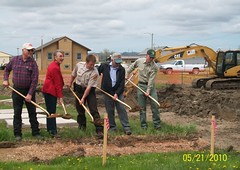The National Rural Employment Guarantee Scheme (NREGA) scheme that was launched by the Central Government in 2005 was a noble initiative but badly implemented. Like many other rural empowerment schemes, NREGA has become a swindling racket for corrupt politicians, bureaucrats, and contractors to fill their pockets even as the intended beneficiaries bemoan delayed payments and rampant bribery.
NREGA – What’s it about?
 NREGA, later renamed to Mahatma Gandhi NREGA (which was pretty much the only rework done on it), was started in 2005 to legally ensure employment of rural people for at least 100 days every year. The scheme was open to any rural household with adult members willing to do unskilled public work, using manual tools, for the minimum wage of Rs.130 per day (2009).
NREGA, later renamed to Mahatma Gandhi NREGA (which was pretty much the only rework done on it), was started in 2005 to legally ensure employment of rural people for at least 100 days every year. The scheme was open to any rural household with adult members willing to do unskilled public work, using manual tools, for the minimum wage of Rs.130 per day (2009).
The central government rolled out the scheme to state governments, ultimately making the scheme active across 635 districts in the country through the Gram Panchayats.
How does NREGA work?
- Rural household members register in writing or verbally at Gram Panchayat, free of cost.
- After verification, Panchayat issues Job Card to worker; expectedly within 15 days of application submission.
- Worker may specify preference of days and time employment is sought; minimum 14 days.
- Panchayat must guarantee employment within 15 days or pay unemployment allowance.
- Worker is granted work within 5km radius or paid 10% extra beyond the parameter.
- Wages must be paid within a week and not later than 2 weeks.
- Permissible works predominantly include water and soil conservation, afforestation and land development works.
NREGA – The fallout
NREGA is under criticism for corruption as well as creating detrimental secondary effects in poverty stricken areas. Since the scheme mandates “manual unskilled” labour, undertaken rural projects suffer in quality. Furthermore, workers learn nothing new; there is no skill upgradation that makes them more employable down the road.
A 2013 Comptroller and Auditor General (CAG) report on NREGA reveals huge gaps in implementation:
- only 30% of 129 lakh approved projects worth over Rs 1.26 lakh crore completed
- rural households’ work dropped from 54% to 43%
- 100 days of guaranteed employment factually only 43
- wage disbursement lower than the minimum specified under NREGA
- discrimination between men and women; women do not get jobs or are paid less
- misappropriation of funds by creation of ghost workers (on paper only); highest in Karnataka and Assam
- no filling of muster rolls at places of work and record manipulation
- unsatisfactory monitoring by Center
- Block Development Officers issuing cheques in their own names
- staff shortage
 NREGA is turning into a sink hole that’s contributing to the growing fiscal deficit of the country. Despite NREGA being active since 8 years, there is no significant development in village roads and infrastructure or improvement in local job opportunities. Furthermore, there are concerns that NREGA is creating agricultural labour deficit during peak harvesting and sowing seasons. Though, if the farmers were paid well and taken care of in bad times, maybe they wouldn’t head out to cities.
NREGA is turning into a sink hole that’s contributing to the growing fiscal deficit of the country. Despite NREGA being active since 8 years, there is no significant development in village roads and infrastructure or improvement in local job opportunities. Furthermore, there are concerns that NREGA is creating agricultural labour deficit during peak harvesting and sowing seasons. Though, if the farmers were paid well and taken care of in bad times, maybe they wouldn’t head out to cities.
The total expenditure under NREGA in 2011-12 was Rs. 37,303.30 crore. Bihar Chief Minister Nitish Kumar, however, states that the implementation of NREGA is suffering due to “non-availability of funds” and CAG findings are “untrue and deceptive.” Another political blame game is on the verge – and it will end nowhere.
Rural Development Ministry is talking about making direct payments to NREGA beneficiaries through Aadhaar cards. But the bottom line is that NREGA does not add long-term value to scheme beneficiaries. It would be wiser to divert funds to better implemented schemes that support farmers and rural populace rather than stick with NREGA that’s clearly a failure.
Related articles






Comments are closed, but trackbacks and pingbacks are open.